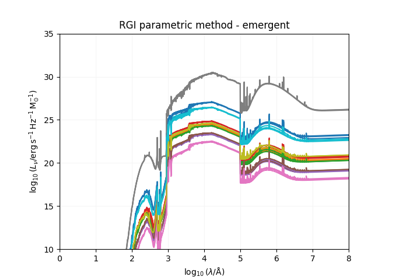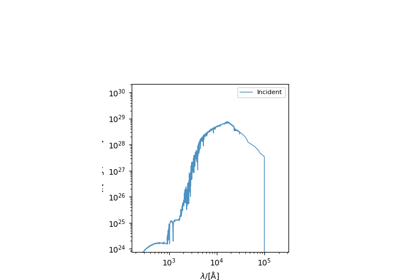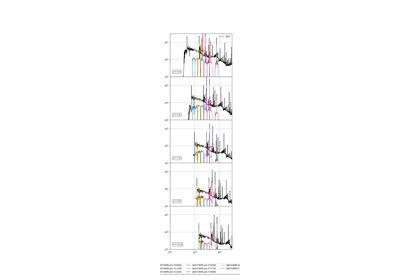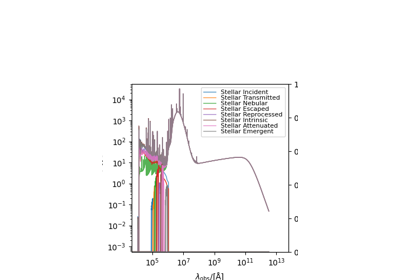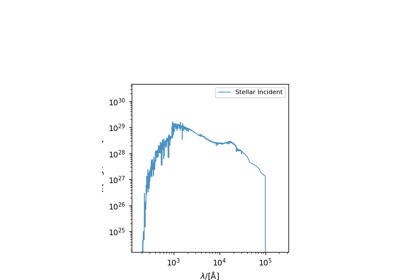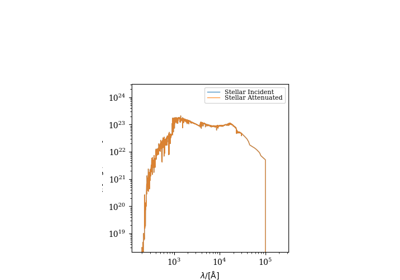synthesizer.emission_models.attenuation.dust¶
A module containing dust attenuation functionality.
This module contains classes for dust attenuation laws. These classes provide a way to calculate the optical depth and transmission curves for a given dust model.
Example usage:
# Create a power law dust model with a slope of -1.0
dust_model = PowerLaw(slope=-1.0)
# Calculate the transmission curve
transmission = dust_model.get_transmission(
0.33, np.linspace(1000, 10000, 1000)
)
Functions
- synthesizer.emission_models.attenuation.dust.Li08(lam, UV_slope, OPT_NIR_slope, FUV_slope, bump, model)[source]¶
Drude-like parametric expression for the attenuation curve from Li+08.
- Parameters:
lam (array-like, float) – The wavelengths (microns units) at which to calculate transmission.
UV_slope (float) – Dimensionless parameter describing the UV-FUV slope
OPT_NIR_slope (float) – Dimensionless parameter describing the optical/NIR slope
FUV_slope (float) – Dimensionless parameter describing the FUV slope
bump (float) – Dimensionless parameter describing the UV bump strength (0< bump <1)
model (string) – Via this parameter one can choose one of the templates for extinction/attenuation curves from: Calzetti, SMC, MW (R_V=3.1), and LMC
- Returns:
tau/tau_v at each input wavelength (lam)
- synthesizer.emission_models.attenuation.dust.N09Tau(lam, slope, cent_lam, ampl, gamma)[source]¶
Generate the transmission curve for the Noll+2009 attenuation curve.
Attenuation curve using a modified version of the Calzetti attenuation (Calzetti+2000) law allowing for a varying UV slope and the presence of a UV bump; from Noll+2009
- Parameters:
lam (array-like, float) – The input wavelength array (expected in AA units, global unit).
slope (float) – The slope of the attenuation curve.
cent_lam (float) – The central wavelength of the UV bump, expected in microns.
ampl (float) – The amplitude of the UV-bump.
gamma (float) – The width (FWHM) of the UV bump, in microns.
- Returns:
- (array-like, float)
V-band normalised optical depth for given wavelength
Classes
- class synthesizer.emission_models.attenuation.dust.AttenuationLaw(description)[source]¶
The base class for all attenuation laws.
A child of this class should define it’s own get_tau method with any model specific behaviours. This will be used by get_transmission (which itself can be overloaded by the child if needed).
- description¶
A description of the type of model. Defined on children classes.
- Type:
str
- get_transmission(tau_v, lam)[source]¶
Compute the transmission curve.
Returns the transmitted flux/luminosity fraction based on an optical depth at a range of wavelengths.
- Parameters:
tau_v (float/array-like, float) – Optical depth in the V-band. Can either be a single float or array.
lam (array-like, float) – The wavelengths (with units) at which to calculate transmission.
- Returns:
- array-like
The transmission at each wavelength. Either (lam.size,) in shape for singular tau_v values or (tau_v.size, lam.size) tau_v is an array.
- plot_attenuation(lam, fig=None, ax=None, label=None, figsize=(8, 6), show=True)[source]¶
Plot the attenuation curve.
- Parameters:
lam (array-like, float) – The wavelengths (with units) at which to calculate transmission.
fig (matplotlib.figure.Figure) – The figure to plot on. If None, a new figure will be created.
ax (matplotlib.axes.Axes) – The axis to plot on. If None, a new axis will be created.
label (str) – The label to use for the plot.
figsize (tuple) – The size of the figure to create if fig is None.
show (bool) – Whether to show the plot.
- Returns:
- fig, ax
The figure and axis objects.
- plot_transmission(tau_v, lam, fig=None, ax=None, label=None, figsize=(8, 6), show=True)[source]¶
Plot the transmission curve.
- Parameters:
tau_v (float/array-like, float) – Optical depth in the V-band. Can either be a single float or array.
lam (array-like, float) – The wavelengths (with units) at which to calculate transmission.
fig (matplotlib.figure.Figure) – The figure to plot on. If None, a new figure will be created.
ax (matplotlib.axes.Axes) – The axis to plot on. If None, a new axis will be created.
label (str) – The label to use for the plot.
figsize (tuple) – The size of the figure to create if fig is None.
show (bool) – Whether to show the plot.
- Returns:
- fig, ax
The figure and axis objects.
Examples using synthesizer.emission_models.attenuation.dust.AttenuationLaw¶
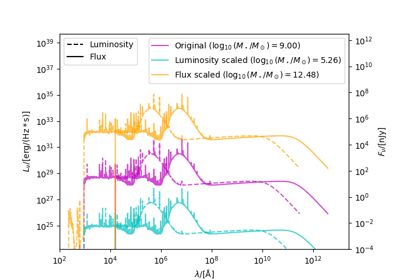
An example showing how to scale a galaxy’s mass by luminosity/flux.
- class synthesizer.emission_models.attenuation.dust.Calzetti2000(slope=0, cent_lam=unyt_quantity(0.2175, 'μm'), ampl=0, gamma=unyt_quantity(0.035, 'μm'))[source]¶
Calzetti attenuation curve.
This includes options for the slope and UV-bump implemented in Noll et al. 2009.
- slope¶
The slope of the attenuation curve.
- Type:
float
- cent_lam¶
The central wavelength of the UV bump, expected in microns.
- Type:
float
- ampl¶
The amplitude of the UV-bump.
- Type:
float
- gamma¶
The width (FWHM) of the UV bump, in microns.
- Type:
float
- get_tau(lam)[source]¶
Calculate V-band normalised optical depth.
(Uses the N09Tau function defined above.)
- Parameters:
lam (float/array-like, float) – An array of wavelengths or a single wavlength at which to calculate optical depths (in AA, global unit).
- Returns:
- float/array-like, float
The optical depth.
- class synthesizer.emission_models.attenuation.dust.GrainsWD01(model='SMCBar')[source]¶
Weingarter and Draine 2001 dust grain extinction model.
Includes curves for MW, SMC and LMC or any available in WD01.
- model¶
The dust grain model used.
- Type:
str
- emodel¶
The function that describes the model from WD01 imported above.
- Type:
function
- get_tau(lam)[source]¶
Calculate V-band normalised optical depth.
- Parameters:
lam (float/array-like, float) – An array of wavelengths or a single wavlength at which to calculate optical depths (in AA, global unit).
- Returns:
- float/array-like, float
The optical depth.
- get_transmission(tau_v, lam)[source]¶
Return the transmitted flux/luminosity fraction.
- Parameters:
tau_v (float/array-like, float) – Optical depth in the V-band. Can either be a single float or array.
lam (array-like, float) – The wavelengths (with units) at which to calculate transmission.
- Returns:
- array-like
The transmission at each wavelength. Either (lam.size,) in shape for singular tau_v values or (tau_v.size, lam.size) tau_v is an array.
- class synthesizer.emission_models.attenuation.dust.MWN18[source]¶
Milky Way attenuation curve used in Narayanan+2018.
- data¶
The data describing the dust curve, loaded from MW_N18.npz.
- Type:
array-like, float
- tau_lam_v¶
The V band optical depth.
- Type:
float
- get_tau(lam, interp='cubic')[source]¶
Calculate V-band normalised optical depth.
- Parameters:
lam (float/array, float) – An array of wavelengths or a single wavlength at which to calculate optical depths (in AA, global unit).
interp (str) – The type of interpolation to use. Can be ‘linear’, ‘nearest’, ‘nearest-up’, ‘zero’, ‘slinear’, ‘quadratic’, ‘cubic’, ‘previous’, or ‘next’. ‘zero’, ‘slinear’, ‘quadratic’ and ‘cubic’ refer to a spline interpolation of zeroth, first, second or third order. Uses scipy.interpolate.interp1d.
- Returns:
- float/array, float
The optical depth.
- class synthesizer.emission_models.attenuation.dust.ParametricLi08(UV_slope=1.0, OPT_NIR_slope=1.0, FUV_slope=1.0, bump=0.0, model=None)[source]¶
Parametric, empirical attenuation curve.
Implemented in Li+08, Evolution of the parameters up to high-z (z=12) studied in: Markov+23a,b
- UV_slope¶
Dimensionless parameter describing the UV-FUV slope
- Type:
float
- OPT_NIR_slope¶
Dimensionless parameter describing the optical/NIR slope
- Type:
float
- FUV_slope¶
Dimensionless parameter describing the FUV slope
- Type:
float
- bump¶
Dimensionless parameter describing the UV bump strength (0< bump <1)
- Type:
float
- model¶
Fixing attenuation/extinction curve to one of the known templates: MW, SMC, LMC, Calzetti
- Type:
string
- get_tau(lam)[source]¶
Calculate V-band normalised optical depth.
(Uses the Li_08 function defined above.)
- Parameters:
lam (float/array-like, float) – An array of wavelengths or a single wavlength at which to calculate optical depths (in AA, global unit).
- Returns:
- float/array-like, float
The optical depth.
- class synthesizer.emission_models.attenuation.dust.PowerLaw(slope=-1.0)[source]¶
Custom power law dust curve.
- slope¶
The slope of the power law.
- Type:
float
